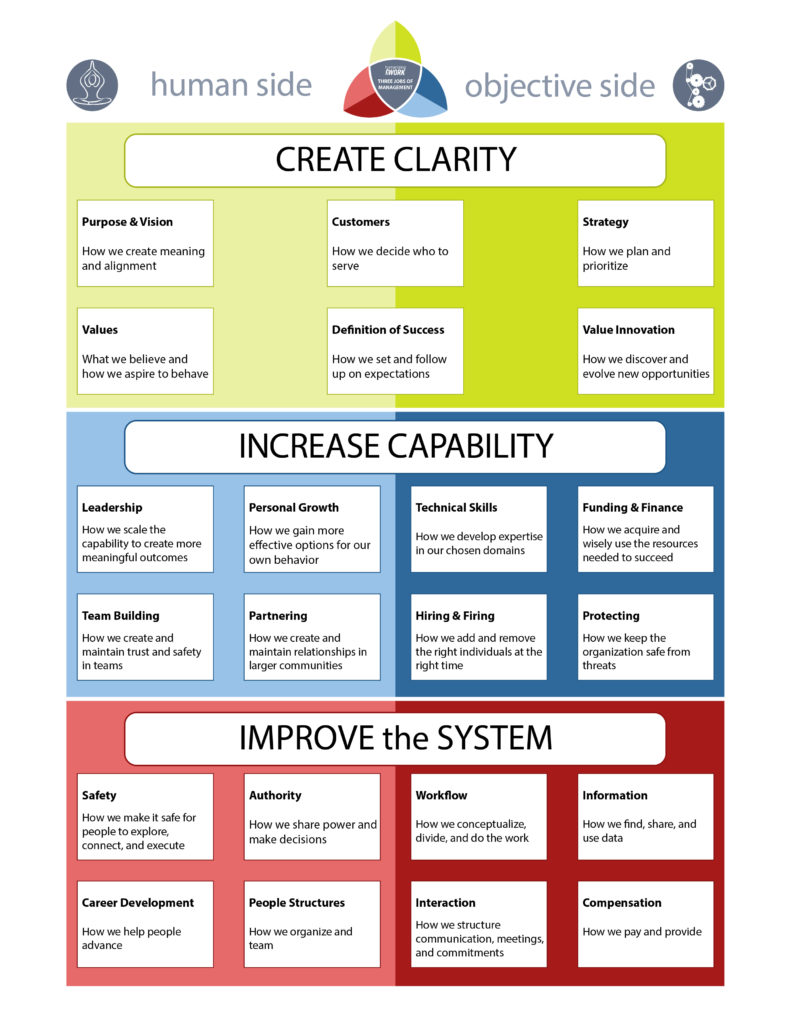We’ve built high performing teams, so what do managers do now?
 “I feel a little lost as a manager, and it’s really hard to admit that, even to myself,” Jen told me.
“I feel a little lost as a manager, and it’s really hard to admit that, even to myself,” Jen told me.
I’ve got good people on the team doing good work. I meet with them, check in regularly, attend meetings, and engage with our partners. Other than that, I don’t know what to do to feel like I put in a good week of work leading my team and organization. And I don’t think I can admit this to anyone without having my competence or value as a professional questioned.”
How Do We Define What Managers Do?
Our understanding of the role of management was strongly influenced by someone almost no one outside of business schools has heard of: Henri Fayol.
Way back in the early 20th century, Fayol described management as having five functions: planning, organizing, command, coordination, and control. In other words, managers primarily direct and oversee the work their employees do. They’re the chessmaster. And Fayol’s definition of management stuck.
As Jen grew professionally and continued to be promoted to her current role as Executive Director, she worked within this traditional definition of the role. She used her experience and expertise to get her team to plan and organize work to be done, and to make sure everyone was doing the right things at the right times.
But the nature of work changed and the culture of work changed. Keeping up with innovation, attracting talented people, and prioritizing equity, diversity, and inclusion meant empowering people and providing them with autonomy, among other things. This led to much of the traditional manager’s job being distributed across several other roles. And with most of her day-to-day responsibilities given over to others, Jen finds herself struggling with 2 distinct things:
- Does she still have value as a professional or has she been left behind (and it’s just a matter of time before others realize it)?
- If her skills and experience can still be an asset to her organization, what does it even mean to be an effective leader managing people in this new landscape?
If you can relate to what Jen is struggling with, let’s agree with at least this one thing: this situation has not been created by a shortcoming on Jen’s part. Rather, it points to a tension within creating and empowering high-performing teams within the constraints of a traditional definition of management.
The Manager Role is Different in High-Performing Teams
For a century, we’ve been taught to direct and control. But one manager directing the work of a whole team is inefficient, at best. Moving decisions about the work closer to work itself makes sense. Teams can leverage the experience, knowledge, and skill of everyone on the team and take advantage of the faster cycles that are possible when a team self-organizes around complex work.
In other words, taking the many jobs a manager used to do and giving them to Product Owners, ScrumMasters, developers, and others on the team is a good move.
But we shouldn’t make the mistake of thinking there’s nothing valuable for the manager to do now. Rather, the manager in a high performing team is freed to contribute in new ways. And for all of these managers, we need a modern definition of the role, because there are certain things empowered teams need in order to be effective.
A Modern Definition: The Three Jobs of Management
Managers of high-performing teams support and enable self-organizing, high-performing teams. How? By doing three jobs, each of which has a human side and an objective side:
- Create Clarity — what are we trying to do together and what does success look like?
- Increase Capability — how can we maximize the resources we can apply towards that end?
- Improve the System — how can we apply that capability towards that end more and more effectively?
Here’s an illustration of those three jobs with several focus areas under each one:

We’ve been teaching these tools to private clients for several years now, and have decided to share them more broadly. We’ve built out a ½ day workshop that helps managers:
- Get a clear map of the manager’s role: Three Jobs with two lenses
- Identify the most important area to focus on right away to start having a bigger impact
- Decide what you can delegate to the team vs. what actions you should own as a manager
- Understand the key difference between a management backlog (for an individual or a management team) and a traditional agile team’s backlog
- Understand how to refine that management backlog and what iteration on those backlog items looks like (hint: it’s not the same as working in Sprints with done increments)
On any given day, a particular manager may focus on just a few of these, but together these generate a sort of “management backlog” that orients the new day-to-day work of the agile manager.
New Skills Required
A manager who’s used to being the expert on the work, who’s used to directing the details of the work for a team, may feel out of their depth looking at this list of focus areas.
For example…
- Coaching for growth, which means knowing when to give advice, when to share a concept or model, when to ask a powerful question—and how to do each of those well
- Facilitating great team meetings, the kind where the team discovers something new and comes to an aligned outcome
- Setting goals and following through with accountability, but without micromanaging
- Communicating effectively with other managers and stakeholders
It’s not command and control. Nor is it hands-off. It’s a different way of engaging to create clarity, increase capability, and improve the system.
Digging In
The three jobs of management may appear simple and straightforward, but doing them well requires a deep understanding of those jobs and the development of new habits. Each organization, team, and manager will need to apply them in their own context.
If you are…
- …frustrated that management feels handwaved in agile organizations,
- …unsure how to contribute to building and maintaining high-performance teams,
- …wishing for clearer ways to communicate to stakeholders about what your teams are up to, or
- …looking to grow your ability to get the best from the people in your organization,
…the three jobs of management provides a human-centered, business friendly approach to the role.
If you are interested in developing your capability to be a different kind of manager, one that creates the conditions for self-organizing teams to thrive, join us for our half-day workshop on The 3 Jobs of Management.
What to Expect
The 3 Jobs of Management: Adding Value in a World of Highly-Empowered Teams
Nov 7, 2022
9:00AM to 1:00PM MT (Denver)
The workshop is hosted virtually to allow for people everywhere to participate, but it’s not a boring, slide-driven webinar. You’ll have fun collaborating with other attendees as we work through the concepts and how they apply in your context. Most participants get as much benefit from networking and learning from their peers as they do from the workshop content!
Our Guarantee
If you’re ready to up your management skills, register below. We’ve had such a good experience sharing this content with others that we’ll guarantee it’s worth your time and money. If you leave this workshop unsatisfied with the value of the time you invested with us, we’ll provide a full refund.